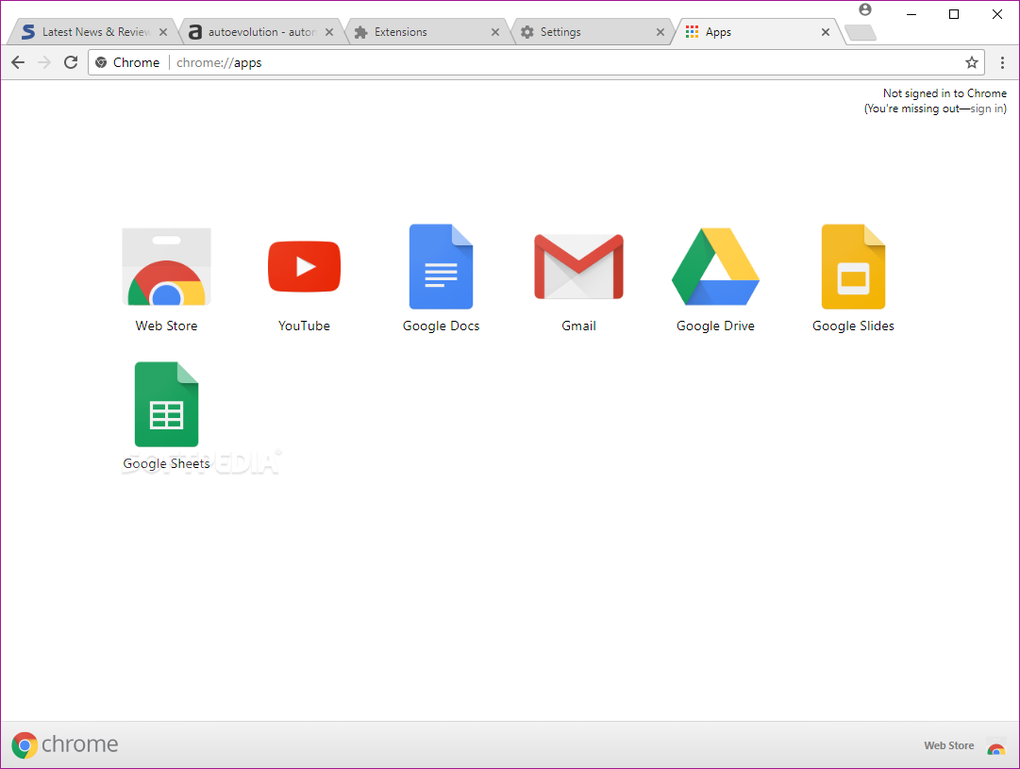ChromeDriver
|
As a result, many users do not know which version of Chrome they have installed. To find out, just click on the key icon which is located in the upper right-hand corner. The updates always incorporate an updated version of the malware and phishing databases, so users will see an alert every time they go to a listed website. Each version of ChromeDriver supports Chrome with matching major, minor, and build version numbers. For example, ChromeDriver 73.0.3683.20 supports all Chrome versions that start with 73.0.3683. Before a new major version of Chrome goes to Beta, a matching version of ChromeDriver will be released. Get more done with the new Google Chrome. A more simple, secure, and faster web browser than ever, with Google’s smarts built-in. Google Chrome (finally?) reduces memory and CPU drain. While a few days ago we were singing the praises of all the novelties of the latest version of Firefox, today it's the turn of its number 1 rival: version 57 of Google Chrome arrives with several new features, foremost among them a savings in the memory and CPU consumption. Try out brand new Chrome Browser features in a pre-release build. Choose this option if you want to install the beta version of Chrome Browser to test its functionality and performance in your environment. Get the 64-bit and 32-bit beta bundles.
Chromium
Chromium version numbers consist of 4 parts: MAJOR.MINOR.BUILD.PATCH.
- MAJOR and MINOR may get updated with any significant Google Chrome release (Beta or Stable update). MAJOR must get updated for any backwards incompatible user data change (since this data survives updates).
- BUILD must get updated whenever a release candidate is built from the current trunk (at least weekly for Dev channel release candidates). The BUILD number is an ever-increasing number representing a point in time of the Chromium trunk.
- PATCH must get updated whenever a release candidate is built from the BUILD branch.
MAJOR and MINOR track updates to the Google Chrome stable channel. In this sense, they reflect a scheduling or marketing decision rather than anything about the code itself. These numbers are generally only significant for tracking milestones. In the event that we get a significant release vehicle for Chromium code other than Google Chrome, we can revisit the versioning scheme.
The BUILD and PATCH numbers together are the canonical representation of what code is in a given release. The BUILD number is always increasing as the source code trunk advances, so build 180 is always newer code than build 177. The PATCH number is always increasing for a given BUILD. Developers and testers generally refer to an instance of the product (Chromium or Google Chrome) as BUILD.PATCH. It is the shortest unambiguous name for a build.
For example, the 154 branch was originally released as 0.3.154.9, but now stands at 1.0.154.65. It's the same basic code with a lot of bug fixes applied. The fact that it went from a Beta release to several 1.0 stable releases just reflects the decision to call some version (1.0.154.36) 'out of Beta'.
Chromium OS
Starting with the R16 release, we standardized on the following: [Chrome Version.]<TIP_BUILD>.<BRANCH_BUILD>.<BRANCH_BRANCH_BUILD>

- The Chromium version is implicit. On the R25 branch, Chromium OS will be using Chromium version 25.
- TIP_BUILD will be updated every time the canaries run on the tip of tree (trunk/master in various VCS schemas). This is typically done every 6 hours. The number increases monotonically.
- BRANCH_BUILD will be updated every time a new build is started on a branch. This happens whenever a commit is made to the branch.
- BRANCH_BRANCH_BUILD is used when a branch of a branch is made. This is a bit uncommon, but has happened. It follows the same rules as BRANCH_BUILD.
An example Chromium OS version string:
Chrome Version 81
- Version 25.0.1364.126
- This is the Chromium version (see previous section for details)
- Platform 3428.193.0 (Official Build) stable-channel stumpy
- This was branched from the tip of tree (ToT) when it was at 3428.0.0. It is the 193rd build on that branch.
Coordinating Versions
Chromium & Chromium OS
Chrome Version 10
All releases of Chromium OS are tagged in the chromiumos/manifest-versions.git repository. You can look up a Chromium version by doing:
- find the buildspec for the specific version you're interested in
- e.g. 5636.0.0-rc1.xml
- look up the git sha1 for the chromiumos-overlay repo in it
- e.g. 4670dbea357617d1fc09db88829b71d8eb1f82e2
- look at the chromeos-base/chromeos-chrome/ subdir of that repo at that revision
- e.g. chromeos-base/chromeos-chrome contains version 35.0.1891.2
- e.g. git ls-files 4670dbea357617d1fc09db88829b71d8eb1f82e2 chromeos-base/chromeos-chrome/
Chrome & Chrome OS
You can use the online CrOS-OmahaProxy app engine to see what versions of Chrome shipped in which versions of Chrome OS.
Alternatively, all releases of Chrome are tagged in the chromeos/manifest-versions.git repository. Follow the same steps as above w/Chromium.
